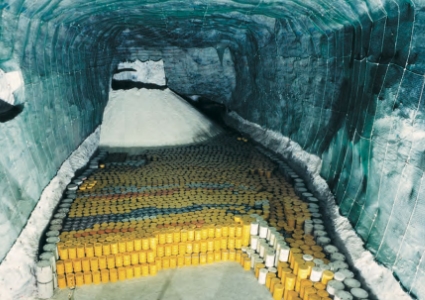Trustee Elections
These are the original issues in this subcategory
- NUCLEAR ENERGY ACCIDENTS
- NUCLEAR ENERGY PLANTS
- NUCLEAR WASTE
The problem of what to do with more than 90,000 tons of nuclear waste accumulated over 66 years by our energy and defense industries has not yet been solved. Currently, commercial and government nuclear facilities incur great expense by storing their waste on-site. This waste includes spent fuel rods along with hundreds of millions of gallons of radioactive water. The Dept. Of Energy (DoE) claims on-site waste storage at about 100 nuclear facilities increases the risk of leaks which could contaminate the environment or of terrorists acquiring this material. DOE wants to build a permanent underground storage facility to reduce costs and minimize security threats. It was studying the feasibility of building a repository capable of storing nuclear waste for possibly 10,000 years deep inside Nevada’s Yucca Mountain. However, due to objections by Nevadans – many of whom experienced the effects of previous radioactive experiments in their state between 1945 and 1992 - plans for a Yucca Mountain repository were abandoned in 2010.
Opponents of a central repository claim it is unnecessary since studies have shown nuclear waste can be safely stored on location for 100 more years. They are also worried about the dangers of transporting nuclear waste across our country. Repository supporters say many power plants storing radioactive waste are located within 50 miles of a major metropolitan area. And many of these facilities are located near oceans or in humid environments which can corrode storage containers over time. A private company has recently won federal approval to build an expansive nuclear waste site in the Texas Panhandle, even as local residents, state lawmakers, environmentalists and Texas Gov. Greg Abbott rail against it.
In 2021, the Nuclear Regulatory Commission issued a license for Interim Storage Partners to store as much as 5,000 metric tons of radioactive waste in Andrews, Texas. It's one of two proposed storage sites - the other is in southeastern New Mexico - that has been under agency review for several years. The spent fuel and waste will be stored in canisters and cask systems. The license authorizes the company to receive, possess, transfer and store up to 5,000 metric tons of spent fuel and 231.3 metric tons of Greater-Than-Class C low-level radioactive waste for 40 years. The company has said it plans to expand the facility in seven additional phases, up to a total capacity of 40,000 metric tons of fuel. Each expansion would require a license amendment with additional NRC safety and environmental reviews. Critics say nuclear repositories should only be located in an area which is supported by its population.
Proposed Legislation: Reintroduction of H.R.1524 - Nuclear Waste Informed Consent Act (117th Congress 2021-2022)
Prospective Sponsor: Rep. Dina Titus (NV)
Opponents of a central repository claim it is unnecessary since studies have shown nuclear waste can be safely stored on location for 100 more years. They are also worried about the dangers of transporting nuclear waste across our country. Repository supporters say many power plants storing radioactive waste are located within 50 miles of a major metropolitan area. And many of these facilities are located near oceans or in humid environments which can corrode storage containers over time. A private company has recently won federal approval to build an expansive nuclear waste site in the Texas Panhandle, even as local residents, state lawmakers, environmentalists and Texas Gov. Greg Abbott rail against it.
In 2021, the Nuclear Regulatory Commission issued a license for Interim Storage Partners to store as much as 5,000 metric tons of radioactive waste in Andrews, Texas. It's one of two proposed storage sites - the other is in southeastern New Mexico - that has been under agency review for several years. The spent fuel and waste will be stored in canisters and cask systems. The license authorizes the company to receive, possess, transfer and store up to 5,000 metric tons of spent fuel and 231.3 metric tons of Greater-Than-Class C low-level radioactive waste for 40 years. The company has said it plans to expand the facility in seven additional phases, up to a total capacity of 40,000 metric tons of fuel. Each expansion would require a license amendment with additional NRC safety and environmental reviews. Critics say nuclear repositories should only be located in an area which is supported by its population.
Proposed Legislation: Reintroduction of H.R.1524 - Nuclear Waste Informed Consent Act (117th Congress 2021-2022)
Prospective Sponsor: Rep. Dina Titus (NV)

- I oppose reforming current nuclear waste policy and wish to donate resources to the campaign committee of Speaker Kevin McCarthy (CA).
- I support prohibiting the Department of Energy from using the Nuclear Waste Fund for certain expenditures involving repositories for disposing of spent nuclear fuel or high-level radioactive waste. Specifically, DOE may not use the fund to pay for disposal in a repository or planning, construction, or operation of a repository unless DOE has entered into an agreement with the state in which the repository is located and with affected local governments and Indian tribes. And wish to donate resources to the campaign committee of Rep. Dina Titus (NV) and/or to an advocate group currently working with this issue.
- I support prohibiting the Department of Energy from using the Nuclear Waste Fund for certain expenditures involving repositories for disposing of spent nuclear fuel or high-level radioactive waste. Specifically, DOE may not use the fund to pay for disposal in a repository or planning, construction, or operation of a repository unless DOE has entered into an agreement with the state in which the repository is located and with affected local governments and Indian tribes. And wish to donate resources to the campaign committee of Rep. Dina Titus (NV) and/or to an advocate group currently working with this issue.
There has been $0.00 pledged in support of this issue
Trustee Election - Opening Date
March 27, 2023
Trustee Election - Closing Date
April 3, 2023